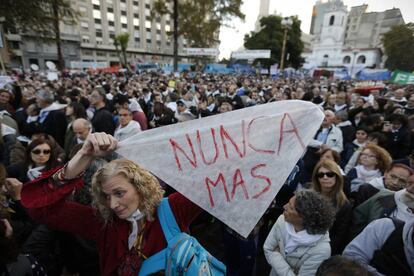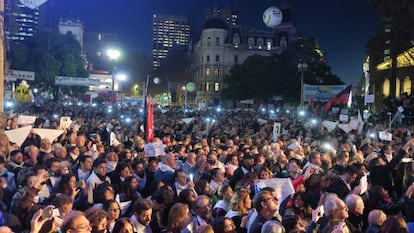Argentineans march to protest ruling favoring repression-era criminals
Tens of thousands of people converge on Plaza de Mayo a day after Congress passed fast-track law
Once again, Argentina has shown the world that when it comes to historical memory issues, it continues to be a global leader. After emerging from a brutal dictatorship (1976-1981) and then watching leading figures of the repression walk free following the pardons of 1991, Argentinean society has come out in force, in what amounts to a civic revolt against a Supreme Court decision that opens the door to early release for inmates convicted of human rights crimes.

On Tuesday, the lower house of Congress held an impassioned session on the issue, and in under 24 hours managed to pass legislation to limit the effects of the Supreme Court ruling.
A day later, tens of thousands of people took to the streets to demand “no more privileges for perpetrators of crimes against humanity.” Entire families with small children in tow turned up at the march, as well as scores of young people, proving that the antidote against repression is passed from generation to generation.
I oppose any tool that favors impunity, more so when it concerns crimes against humanity
President Mauricio Macri
They all converged on Plaza de Mayo, the square made famous by the mothers of the “disappeared” who have been marching there every week for the last 40 years. There were a few cries against the conservative government of Mauricio Macri, whom some accuse of being behind the court ruling – two out of the three justices who delivered the decision were appointed by the president.
Macri himself has since rejected a court decision that would favor more than 500 inmates by making any time spent in preventive detention count twice as long as time spent serving the sentence proper.
But the overall mood was one of satisfaction.
“Fortunately, society has reacted firmly,” said Estela Carlotto, leader of the Grandmothers of Plaza de Mayo movement. “Many judges are rejecting the calls to release the repressors. Lawmakers passed a law that seeks to stop the implementation of the Supreme Court’s ruling.”

Looking out at the sea of white headscarves – the same symbol used by the Plaza de Mayo demonstrators since 1977 – organizers of the march felt overwhelmed at their own success, and estimated that around 400,000 had come out in support. All avenues leading into the square were clogged with people.
The impact of this social movement can be gauged by the fact that for the first time, Mauricio Macri’s position was in line with his predecessor, the leftist Cristina Fernández de Kirchner. Macri has stated that “I oppose any tool that favors impunity, more so when it concerns crimes against humanity.” Meanwhile, Fernández de Kirchner, speaking from Brussels, said that “with these three votes there is an attempt to take Argentina back 20 years on human rights issues after being a role model.”
The onus is now on the three justices who handed down the ruling – Rosatti, Rosenkantz and Highton de Nolasco – to defend their decision. The repercussions within the Supreme Court itself are hard to foresee, as its president, Ricardo Lorenzetti, delivered a dissenting opinion in the case.
The only ones who could offer reconciliation and forgiveness are our children, and they are not here
“Once more, it has been demonstrated that el pueblo unido jamás será vencido [the people united shall never be defeated],” said Tati Almeida, of the Madres de Plaza de Mayo Línea Fundadora group, quoting a popular political slogan from the 1970s. “This law is so aberrant […] that there’s been a reaction not just in Argentina, but abroad as well.”
“What a coincidence that the Church hierarchy also talks about reconciliation,” she adds. “Never. No reconciliation and no forgiveness. The only ones who could offer that are our children, and they are not here.”
English version by Susana Urra.
Tu suscripción se está usando en otro dispositivo
¿Quieres añadir otro usuario a tu suscripción?
Si continúas leyendo en este dispositivo, no se podrá leer en el otro.
FlechaTu suscripción se está usando en otro dispositivo y solo puedes acceder a EL PAÍS desde un dispositivo a la vez.
Si quieres compartir tu cuenta, cambia tu suscripción a la modalidad Premium, así podrás añadir otro usuario. Cada uno accederá con su propia cuenta de email, lo que os permitirá personalizar vuestra experiencia en EL PAÍS.
¿Tienes una suscripción de empresa? Accede aquí para contratar más cuentas.
En el caso de no saber quién está usando tu cuenta, te recomendamos cambiar tu contraseña aquí.
Si decides continuar compartiendo tu cuenta, este mensaje se mostrará en tu dispositivo y en el de la otra persona que está usando tu cuenta de forma indefinida, afectando a tu experiencia de lectura. Puedes consultar aquí los términos y condiciones de la suscripción digital.








































